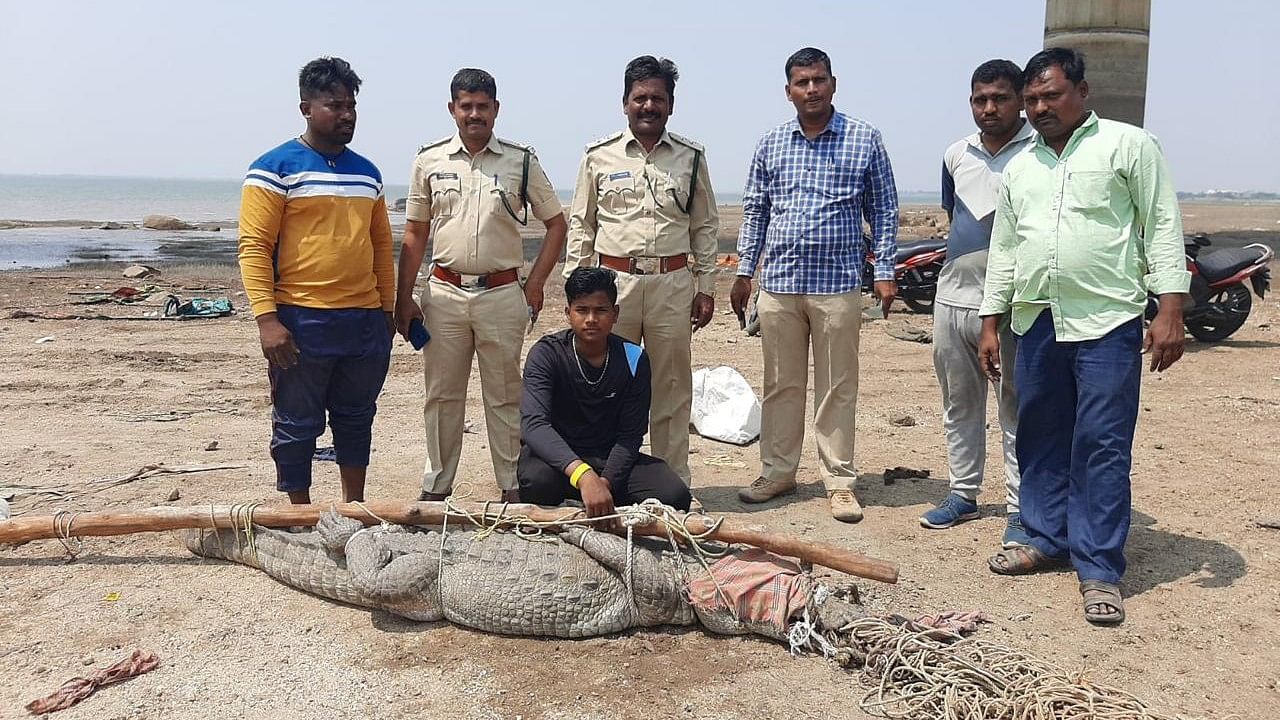
Forest staff with a crocodile they caught on the banks of Krishna river near Kolhar of Vijayapura district.
Image Courtesy: Forest department
Kalaburagi: The disappearance of smooth-coated otters, decline of birds due to absence of food base and excessive fishing have led to a substantial increase in the population of crocodiles in Krishna river.
Otters, birds and monitor lizards prey on crocodile eggs and hatchlings, thus controlling the reptile population. A single female crocodile lays a clutch of more than 30 eggs that incubate for 80-90 days.
Otters vanished from the Krishna at least 10 years ago owing to the loss of habitat and breeding ground due to rampant sand mining. Birds like ibis, pelican, heron have over the years stopped visiting the river as small fish populations, their main source of food, have reduced. Experts attribute this development to the rise in illegal fishing in the river.
“The smooth-coated otter relies primarily on large fishes for food. Birds depend on small fishes. But indiscriminate fishing activities deprived them of their main source of food. Due to this, otters and birds have disappeared from the river, leading to a rise in crocodiles over the years,” says wildlife researcher Samad Kottur from Hosapete.
Wildlife researchers and forest officials claim that the reptile population in the Krishna, the third longest river in the country that flows along a stretch of 483 km in Karnataka, has increased exponentially during the last one decade, resulting in more sightings and human-crocodile conflicts.
“We have rescued more than 120 crocodiles from Krishna river and the backwaters of the reservoirs in the last one year,” says Muddebihal range forest officer Basanagouda Biradar. Five taluks in Vijayapura, through which the Krishna flows, come under his jurisdiction. Krishna flows through Belagavi, Vijayapura, Kalaburagi, Yadgir, Bagalkot and Raichur districts in the state.
Annually, they used to rescue 25-30 crocodiles in his range before 2020. “Earlier, we used to see only 1-2 crocodiles on small islands in Almatti and Narayanpur backwaters. Now, more than 10-12 crocodiles are being sighted on every island. There has been an exponential increase in the number of rescued crocodiles in the last four years,” he says.
Rescue centres
Conversationalists have sought setting up of crocodile rescue centres along the river to prevent human-crocodile conflicts. They also urge the government to build sand banks and islands for nesting of birds to restore the ecological balance.
“The numbers of these reptiles are stable in Tungabhadra, Cauvery and other rivers as their natural predators are thriving there. We have to attract birds, otters and other animals to Krishna river to strengthen the ecosystem,” says Kottur.
“I have witnessed considerable rise in crocodile population in Krishna river. Hundreds of crocodiles were rescued last year from the receding
waters due to drought,” says Vijayapura assistant conservator of forests Bhagyavanth Masudi.
Meanwhile, the villagers living on the river banks are spending sleepless nights as crocodiles are sighted near their farmhouses. Since electricity is supplied to pump sets only at night, they risk their lives while irrigating the crops in the dark.
“We live under the fear of crocodile attacks but we have no option as we depend on the river for farming, fishing and washing clothes. We have protested against power supply only at night. Forest officials have taken no steps to prevent crocodile attacks,” says farmer Somu Biradar from Ronihal village in Kolhar taluk of Vijayapura district. Last year’s drought has only worsened the situation.
“They enter the lakes when water is released from dams through canals for drinking water purposes,” says Basanagouda Biradar.
Forest officials in Vijayapura started observing World Crocodile Day on June 17 two years ago to create awareness about these reptiles.
Experts say officials should be empowered to restore the ecology by improving the habitat for smooth-coated otters and birds by preventing illegal fishing and sand mining.